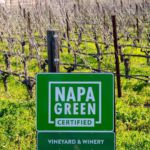On Tuesday I moderated a panel at Napa Thrives, a wine-industry conference focused on climate change. The subject of my panel was one that’s been on many Californians’ minds lately: water.
Notwithstanding the 2 inches of rain the North Bay got last weekend, we are still in a severe drought. A lack of water affects all of our lives here; California just ordered cities including San Francisco to stop pumping water from rivers and creeks. But it presents existential questions for California agriculture, including wine, as climate change intensifies our state’s drought cycle. If wine is to have a future here, it has to figure out how to reduce its water consumption.
None of this is news. But the conversation during Tuesday’s panel — especially some context provided by panelist Peter Gleick, a leading climate scientist who studies water at Oakland’s Pacific Institute — helped me see the situation in a new light.
The most shocking figure, to me, that Gleick shared was that 80% of California’s water goes to agriculture. Maybe that shouldn’t be surprising given how much of the country’s food and drink we produce here. But it underscores the fact that water issues have to be handled on an industry-wide basis, not simply by asking laypeople to stop watering their lawns.
Vineyards gulp a lot of water, but the wine production process uses considerable amounts at other stages too, largely to clean the production facility. Compared with other forms of beverage production, winemaking does not look very water-efficient: Coca-Cola used 1.84 liters of water for every liter of Coke produced in 2020, while wineries use about 7 to 16 liters of water per liter of wine, according to the journal Water Science & Technology.
Gleick reminded us that we have three options when it comes to climate change: mitigation (trying to lessen the effects of climate change), adaptation (changing our behavior to accommodate the changing climate) and suffering (exactly what it sounds like). When it comes to wine, the “suffering” scenario might entail producing lower-quality wine or making less of it — which, for a $40 billion statewide industry, matters.
We’re already seeing some of these effects. Last year’s crop was severely diminished, volume-wise, by the drought, which essentially weakens grapevines and causes them to yield fewer grapes. Gleick described the situation as “peak water”: We’re reaching the limit of what we can do with the amount of water we currently have.
The narrative about these types of climate-change effects tends to focus on our collective helplessness — and indeed, no winemaker could have caused the sky to rain more last year. But that sentiment obscures the opportunity that human beings have to mitigate the situation.
“We can grow more grapes with less water,” Gleick said.
The question is: How? For one thing, grape farmers should be investing in widely available technologies that allow them to precisely monitor their soil moisture on a micro-level, so that they can irrigate only in the spots that absolutely need water, rather than watering an entire vineyard indiscriminately.
Recycled wastewater, Gleick suggested, will also be key to the solution. Many larger estate wineries in the Bay Area already have wastewater treatment plants onsite, and others have built pipelines to municipal facilities that provide recycled water. Another panelist, Nathalie Jure, the director of viticulture at Opus One, spoke about her company’s use of recycled wastewater. To the extent that there’s a negative perception associated with the idea of this reused runoff, it may be important that high-profile, reputable wineries like Opus One speak publicly about their embrace of it.
Additional technologies are becoming available that can help. We heard on the panel from Alex Farren, who runs a company called BlueMorph that uses UV light to sanitize winery tanks, replacing the standard process of cleaning with caustic chemicals and lots of water. Most wine drinkers probably aren’t attuned to the details of winery sanitation, but eliminating excessive water use at every stage of the production process counts.
The good news: Wine is doing better than many other forms of agriculture. Of all the water used by California agriculture, wine accounts for only about 3%, Gleick said. But there’s still a long way to go.
The Napa Thrives conference will continue with five more events throughout June, and Thursday’s program, focused on energy efficiency, is moderated by former Chronicle newsletter editor Taylor Kate Brown.
I hope events like these can continue to catalyze meaningful action in the wine industry and in all of our lives. In the meantime, please, everyone, stop watering your lawns!



